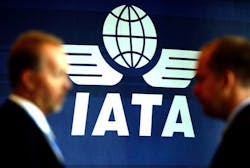EU Emissions Spat Could Trigger Trade War
The European Union’s emissions trading scheme is a “direct attack” on foreign governments’ national sovereignty and has already damaged international trade relations to the point where the stagnant aviation industry is in danger of being the battleground for a global trade war, the head the International Air Transport Association told reporters in Abu Dhabi.
“The reason governments are objecting to having their airlines included in the European Emissions Trading Scheme (EETS) is they see the extra territorial application of the scheme to be a direct attack on their sovereignty,” Tony Tyler, CEO of IATA said at a press conference.
“The fact that an aircraft belonging to an airline of the UAE should have to pay a tax in effect to Europe when it is flying in the UAE’s own airspace is one that the UAE government would find hard to accept,” he added.
The EU’s ETS, which came into force at the beginning of this year, forces operators either to reduce their emissions, buy more carbon credits from other airlines or sectors, or fund emission reductions outside the EU.
Authorities in countries including the US, Australia, Singapore, Canada, Qatar, Brazil and Russia have voiced their concerns over the scheme and Tyler said it was already leading to a deterioration of diplomatic relations and could cause a backlash against Europe.
“It is clear already that international relations are being damaged… One reads also that China has stopped its airlines from ordering any Airbus long haul aircraft, that has been widely reported.
“Retaliation may be launched by different states against European carriers on the basis that if you are charging my carriers I’ll charge your carriers, and that is the last thing we want and the industry can’t afford to be caught in the middle of this kind of trade war.
[[banner]]
“We have to hope that wiser council will prevail and Europe will find a way to moderate in what it is doing to remove this obstacle from progress,” he added.
The Gulf’s carriers have been especially affected by the move, as they are still seeking to expand their route networks in Europe.
“As an airline we are strongly opposed to the unilateral measures imposed by the European Union on our flights into and out of Europe, especially as they include areas outside European airspace,” Etihad CEO James Hogan said earlier this year.
In August 2011, an Etihad spokesperson estimated that the cost to the carrier of the ETS could amount to $719m over the next eight years.
The diplomatic spate comes at a time when IATA’s recent Industry Financial Forecast estimated airlines globally will make $4.1bn this year. Of this, $700m is estimated to be generated by the Middle Eastern carriers, which is down on the $1bn which airlines in the region made last year.
Earlier in the day, Sheikh Nahyan bin Mubarak Al Nahyan, UAE Minister of Higher Education and Scientific Research used his keynote speech to “declare that a healthy, prosperous world passenger airline industry is one of most potent forces in our quest for world peace.”
Sheikh Nahyan also hit out at interference by governments in bilateral aviation agreements as a potential threat to this.
He highlighted the EETS as an example of this. “Some states that have threatened to introduce national taxes on the pretext of environmental protection may be seen as unwarranted and may lead to retaliatory responses… We in the UAE that the environmental concerns should be fair and balanced,” he said.
The European Union was last week awarded the prestigious annual Nobel Peace Prize.
Copyright 2012 ITP Business Publishing Ltd.Provided by Syndigate.info, an Albawaba.com companyAll Rights Reserved

